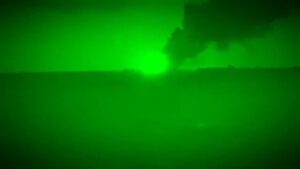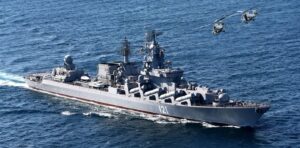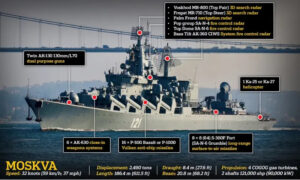Talking heads and “experts” on television drive me crazy. Many have no true experience or subject matter expertise; they also demonstrate no system to assess accuracy of their conclusions. You can do better in assessing accuracy by assigning levels of certainty to it. The highest category of accuracy is one with a “100% certainty” to it. The sun comes up in the East is one of them, most events aren’t this certain. A little less certainty, but still a great deal, is “beyond a reasonable doubt” used in criminal trials. While I’ve never seen a judge assign a numerical value to that, it seems that “beyond a reasonable doubt” is in the 85% to 99% category of certainty. It does not mean there is no doubt, only that it is so small as to be unreasonable.
The lowest category of certainty is “more likely than not” to be accurate, the standard used in many civil trials, and for military Inspector General investigations. Think 51% or more certainty and it is “more likely than not” it occurred. On the other end, if you assess a 50% chance something happened, you’re flipping a coin; the further less than 50%, the more likely it is to be inaccurate.
Let’s apply that to the Russian cruiser Moskva, flagship of their Black Sea Fleet, that sank in the Black Sea off the coast of the Ukraine (at 45°10’43.39″N, 30°55’30.54″E.) on Thursday, April 14, 2022. Ukraine says it hit the Moskva with anti-ship cruise missiles which sparked a fire that detonated the ship’s ammunition. On the other side, Russia’s Defense Ministry says a fire of unknown origin detonated the ship’s stored ammunition; the resulting explosions left the Moskva with structural damage; and then the warship sank amid rough seas as it was being towed to a nearby port.
So the central question to analyze is this. Was it poor air defenses on the Moskva that allowed Ukrainian anti-ship missiles to hit, and cause a fire and/or explosion which was made fatal in scope by inefficient damage control? If so, we can rule out an accidental fire caused by lax safety procedures.
I am not a naval expert, but I know a lot of people who are, including some who served on U.S. destroyers and cruisers similar in some degree to the Moskva, others who were submariners who were trained to hunt ships like the Moskva, and even one who was actually on a Russian ship very similar to the Moskva. Here is an educated take.
Russian ship defense systems have major inadequacies. While they do have a varied number of anti-missile systems, and they do have a battle center in the ship to control these weapons, they have never achieved the degree of systems-integration that US Navy ships have in a fast-response system such as a Combat Information Center (CIC), which collates thousands of pieces of information, using really sophisticated tracking and info-processing, and determines the best solution to neutralize any threat at the most advantageous distance from the ship, with backups in case of a miss, and not allowing a threat to slip through because it had not been tracked.

Combat Information Center of the “Battlestar Galactica”. CIC on today’s US Navy ships put this one to shame
If the Ukrainians fired multiple missiles, maybe up to four or so, and used decoys or electronic warfare to confuse the Russian defenders, and given that these missiles fly really low (9 to 30 feet above the water), have a cross-section of about 16 inches (and a radar cross-section of even less with stealth “paint” when seen from the front), and all that makes it really hard to detect and then hit them, given Russian inadequacies in this area, it is “more likely than not” that at least one missile struck the Moskva.
If so, now the Russians have problems. The warhead weighs 350 pounds; add in some of the fuel left in the 1900-pound missile and you are going to get “beyond a reasonable doubt” that a large explosion occurred per missile strike. Both accounts conclude “100% certainty” a number of volatile and flammable explosives were nearby such as anti-ship missiles below. But a lot of warships in history have had explosions or large fires and have not sunk.
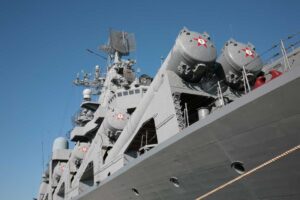
Nearby sources for more fire and secondary explosions (Vulkan missiles, with their 750-pound warheads, in their firing containers; unless the missiles were armed with nuclear warheads!)
Except the Russians have major problems in damage control. US Navy ships have many watertight compartments to limit the spread of toxic gases, fire and flooding in case of accident or attack. Officers touring the Moskva saw no such extensive compartmentalization. There were few watertight hatches between compartments. Unless watertight hatches later were installed, it is “beyond a reasonable doubt”, probably approaching “100% certainty”, that the Moskva did not have adequate watertight integrity.
But it gets worse. On many warships, painted areas on which sailors walk have special grip surfaces to prevent slipping. That’s an added expense and Russian ships like the Moskva substituted tar for special “rough” paint. Tar is highly flammable, and is easily tracked to other areas of the ship, so instead of trying to limit the spread of flame damage, it is “more likely than not” that cutting corners on Russian ship design made their warships even more susceptible to spreading fire damage.
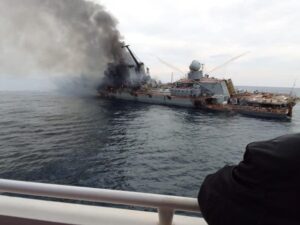
Moskva heavily damaged; note two sprays of water; one pointing left is to put out fires; one pointing right toward the rear is getting water off , so the ship does not take on too much and capsize
However, a ship is only as good as its crew. The Russian navy, and its ships, are run by commissioned officers. They have very few non-commissioned officers (like petty officers). US warship skippers swear by the professionalism, bravery and common sense of the corps of non-commissioned officers. What if you didn’t have many on a ship? Could just the officers have saved the ship, racing around and conducting necessary damage control? What about the junior enlisted men?
Well, the crew size should have been about 510. Because of a lack of non-commissioned officers, about 20% of the crew are officers, so about 100. The enlisted sailors are conscripts, not volunteers. How many who want to be there is unknowable. What is known is that their military service is 12 months. It is “more likely than not” that the majority of the enlisted men can only accomplish basic damage control tasks, because 12 months is not enough time to get trained up and develop experience. It is at least “more likely than not” that the 100 officers — assuming none had been killed in the attack and none were strap-hanger staff officers just along for the ride to get “combat time” and not part of the team — would have been an insufficient strength to save the ship.
Finally there is the bravery factor. Every American Navy veteran I have ever met says that from the first day in service they have drilled into them, “Don’t Give Up the Ship,” the dying words of Commander James Lawrence during the War of 1812. It takes a ton of bravery to run toward raging fires on a badly-damaged warship. I do not know the Russian translation of “Don’t Give Up the Ship.” But I do know that if a great number of conscripts on the Moskva did not want to be there, they may have known the translation, but it is “more likely than not” they wouldn’t have followed its meaning, because 12 months is not enough time to overcome a fear of fire.
Access to classified information would increase our certainty one way of the other, but using good, old-fashioned logic and observation, and you can reach a better solution than a talking head – or an “expert” with an agenda.
